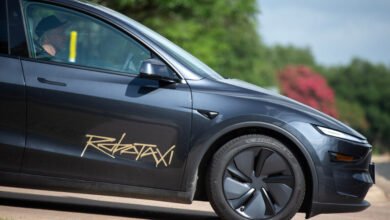Tesla & Samsung Ink $16.5B AI Chip Deal for Future Tech

▼ Summary
– Tesla has secured a $16.5 billion agreement to purchase chips from Samsung Electronics.
– The deal may strengthen Samsung’s struggling contract manufacturing business.
– The partnership is not expected to boost Tesla’s EV sales significantly.
– It is unlikely to accelerate Tesla’s rollout of robotaxis.
– The focus is on securing chip supply rather than immediate business growth for Tesla.
Tesla has secured a massive $16.5 billion agreement with Samsung Electronics to supply advanced semiconductor chips, marking a significant step in strengthening its artificial intelligence capabilities. The partnership focuses on next-generation processors that will power Tesla’s autonomous driving systems and other AI-driven technologies. While this deal provides a major boost to Samsung’s struggling chip manufacturing division, industry analysts note it may not directly translate into faster electric vehicle production or accelerated robotaxi deployment for Tesla.
The collaboration highlights Tesla’s ongoing efforts to reduce reliance on external suppliers by securing long-term chip contracts. Samsung’s cutting-edge fabrication technology will likely play a crucial role in developing Tesla’s proprietary Full Self-Driving (FSD) hardware and Dojo supercomputing platform. However, experts caution that chip supply alone won’t resolve Tesla’s broader challenges in achieving full autonomy or scaling production.
Samsung stands to gain considerably from this agreement, as its semiconductor division has faced declining profits amid global market fluctuations. The Tesla contract represents one of its largest deals in recent years, potentially stabilizing revenue streams. Meanwhile, Tesla continues diversifying its supplier base beyond traditional partners like TSMC, ensuring more control over its technological roadmap.
The deal underscores the growing importance of AI-specific chips in the automotive sector, where processing power is becoming as critical as mechanical engineering. Both companies remain tight-lipped about specific technical details, but sources suggest the chips will be optimized for machine learning tasks essential for autonomous vehicles. While this partnership strengthens Tesla’s hardware foundation, the real test lies in software development and regulatory approval for self-driving systems.
Market observers will be watching closely to see how this collaboration influences Tesla’s competitiveness in the AI race against rivals like Waymo and traditional automakers investing heavily in autonomous technology. The agreement also signals Samsung’s ambition to expand beyond consumer electronics into automotive tech, positioning itself as a key player in the future of mobility.
(Source: Fast Company)





